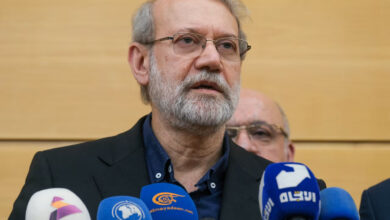Jerusalem — Israel's foreign minister warned on Thursday that Israel will not negotiate with a new Palestinian unity government that includes the Hamas militant group.
Avigdor Lieberman spoke a day after rival Palestinian factions Hamas and Fatah reached a unity deal in Cairo to end their five year long dispute.
For Palestinians, the Egypt-brokered deal revived hopes of ending their bitter infighting that weakened them politically and caused the deaths of hundreds in violent clashes and crackdowns.
The Palestinians say the move is a step toward independence, but unity between Fatah and Hamas appears unlikely to jump start negotiations with Israel for an independent Palestinian state.
Israel swiftly rejected the prospect of a Palestinian government including Hamas, citing the militant group's stated goal of destroying the Jewish state. The US expressed similar concerns.
"It needs to be clear that such an agreement is crossing a red line," Lieberman told Israel's Army Radio. "The significance of the agreement is that terrorists will take hold of the West Bank. Hundreds of terrorists will flood the West Bank and therefore we need to prepare for a different situation."
Rivalries between the two Palestinian factions began in 2006 after the militant Islamic group Hamas won elections in Gaza and the West Bank. A year later, Hamas seized power in Gaza in a violent takeover.
The split left Hamas in control of the Gaza Strip, and the Palestinian Authority, dominated by Fatah, in the West Bank.
The two territories are separated by Israel. The Palestinians claim both territories for a future independent state, along with east Jerusalem.
Israel has held peace talks with the Fatah-led government but has shunned Hamas. The group is considered a terrorist organization by Israel, the US, and European Union for its role in sending dozens of suicide bombers and thousands of rockets into the Jewish state and its commitment to the destruction of Israel.
The Egyptian-brokered plan calls for the formation of a single caretaker Palestinian government in the coming days. The government would administer day-to-day business until new presidential and legislative elections are to be held in a year's time.
Lieberman said the agreement was a result of panic on both sides. He said Fatah was reeling from the fall of its longtime patron, former Egyptian President Hosni Mubarak, and Hamas was nervous because of President Bashar al-Assad's shaky status in Syria.
Hamas has insisted that its agreement with Fatah did no indicate any recognition of Israel.
Lieberman said that Israel "will not negotiate with a terrorist organization" and would consider various sanctions it could take against a new Palestinian government with Hamas in it — including travel restrictions and withholding tax revenues it collects on the Palestinians' behalf in the West Bank.




